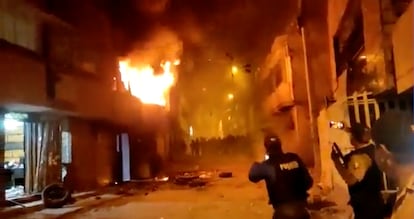Residents confront criminal gang in a pitched battle in capital of Ecuador
In a crime-afflicted area of Quito, locals stood up to a violent crew operating in their midst by throwing stones and setting fire to the home of the alleged ringleader, a woman known as ‘La Pastora’

The Comité del Pueblo neighborhood to the north of Ecuador’s capital, Quito, turned into a war zone on Sunday, June 18, when residents responded to threats from a criminal gang operating in the area with a hail of rocks and Molotov cocktails. Almost two hours after the conflict got underway, the police appeared on the scene, killing one of the alleged criminals and injuring another person.
The face-off was recorded on video by the residents, who organized themselves into a small army, removing the cobblestones from the sidewalks, and smashing them into small pieces to be used as weapons. Community alarms went off in the vicinity, warning locals to leave their homes and join in the fray. “We all plucked up the courage,” says one resident. The violence culminated in setting fire to the home of the gang’s female leader, known as La Pastora (the Shepherdess). This residence was considered the headquarters for all drug trafficking activities. When it went up in flames and the pólice arrived, the criminals temporarily retreated.
Far from being another episode of gang warfare, the violence that erupted on Sunday was the result of the residents’ being sick of having to live with a constant sense of insecurity that is widespread in Ecuador. The pitched battle lasted until the early hours of Monday morning, June 19. After the police left the scene, the criminals returned on motorbikes, firing shots into the air and making further threats. “They are going to set off bombs under people’s homes and they said that war had been declared,” says another resident.
The conflict was triggered at 6 p.m. on June 18 by the assault of a young woman in the neighborhood, prompting a number of locals to come to her aid and the gang members to flee. The residents then grouped together to stand guard over their neighborhood and were subsequently confronted by two armed men on a motorcycle. The residents asked the men to leave, and they did, only to return several minutes later with 10 more armed men in tow who began shooting at the crowd. “We ran and took cover while they shouted and threatened us, but then we decided to stand up to them and went out with sticks to see them off,” according to one resident.
Police say they have identified the criminal gang and its leader La Pastora, who has been arrested 13 times between 2002 and 2021. According to Victor Herrera, Quito’s police chief, La Pastora is behind the growing number of crimes related to drug trafficking and concealment of stolen goods. “We understand the problem in the neighborhood,” says Fausto Salinas, head of Ecuador’s police force. “The lady who presents as a victim is behind the terror.” However, there was no hard evidence found to incriminate La Pastora in this instance and she escaped arrest.
The day after the confrontation, residents reported that the gang carried out its threats against a handful of businesses. “We can’t live like this,” says one resident. “We can’t even go out. We are terrified.”
While the residents of Quito’s Comité del Pueblo neighborhood were standing up to the gang with rocks, sticks and homemade bombs, President Guillermo Lasso was delivering a speech on a national network about the security policies being undertaken by his government. “We are moving towards the objective of strengthening the police to improve its capacity to protect our families,” said the President, referring to the recruitment of 8,500 extra police officers.
Sign up for our weekly newsletter to get more English-language news coverage from EL PAÍS USA Edition
Tu suscripción se está usando en otro dispositivo
¿Quieres añadir otro usuario a tu suscripción?
Si continúas leyendo en este dispositivo, no se podrá leer en el otro.
FlechaTu suscripción se está usando en otro dispositivo y solo puedes acceder a EL PAÍS desde un dispositivo a la vez.
Si quieres compartir tu cuenta, cambia tu suscripción a la modalidad Premium, así podrás añadir otro usuario. Cada uno accederá con su propia cuenta de email, lo que os permitirá personalizar vuestra experiencia en EL PAÍS.
¿Tienes una suscripción de empresa? Accede aquí para contratar más cuentas.
En el caso de no saber quién está usando tu cuenta, te recomendamos cambiar tu contraseña aquí.
Si decides continuar compartiendo tu cuenta, este mensaje se mostrará en tu dispositivo y en el de la otra persona que está usando tu cuenta de forma indefinida, afectando a tu experiencia de lectura. Puedes consultar aquí los términos y condiciones de la suscripción digital.








































